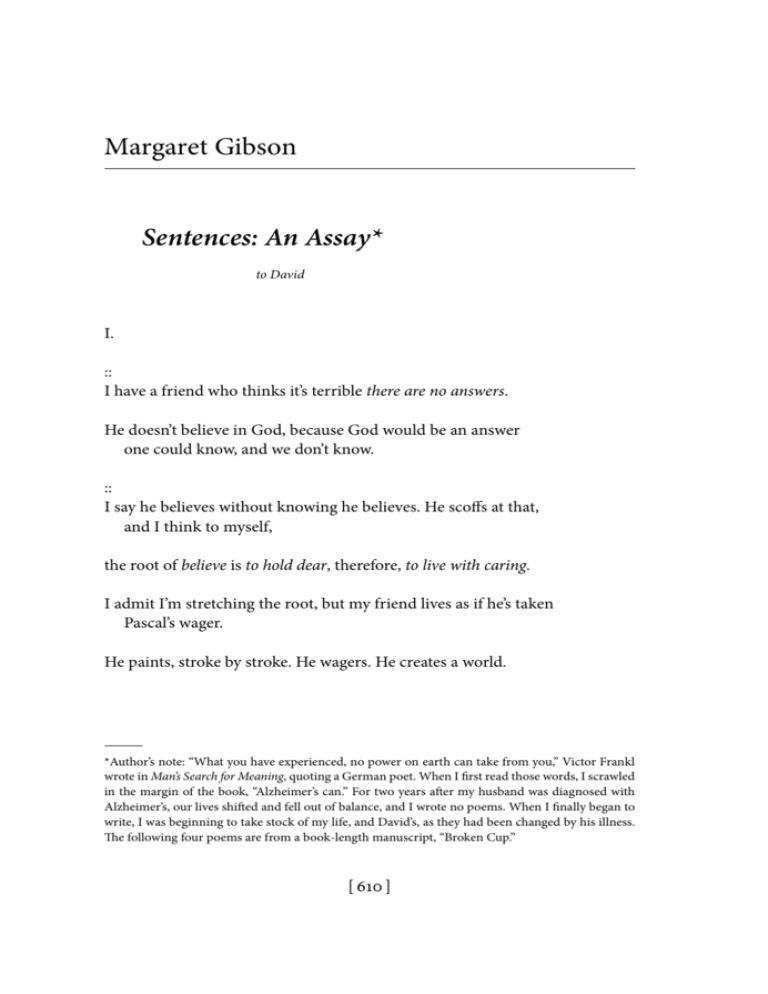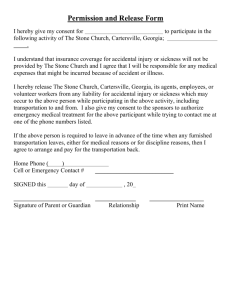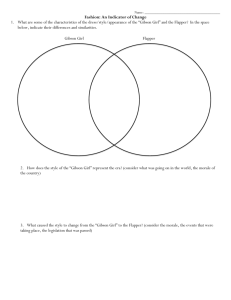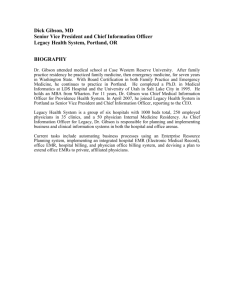Margaret Gibson Sentences: An Assay*
advertisement

Margaret Gibson Sentences: An Assay* to David I. :: I have a friend who thinks it’s terrible there are no answers. He doesn’t believe in God, because God would be an answer one could know, and we don’t know. :: I say he believes without knowing he believes. He scoffs at that, and I think to myself, the root of believe is to hold dear, therefore, to live with caring. I admit I’m stretching the root, but my friend lives as if he’s taken Pascal’s wager. He paints, stroke by stroke. He wagers. He creates a world. *Author’s note: “What you have experienced, no power on earth can take from you,” Victor Frankl wrote in Man’s Search for Meaning, quoting a German poet. When I first read those words, I scrawled in the margin of the book, “Alzheimer’s can.” For two years after my husband was diagnosed with Alzheimer’s, our lives shifted and fell out of balance, and I wrote no poems. When I finally began to write, I was beginning to take stock of my life, and David’s, as they had been changed by his illness. The following four poems are from a book-length manuscript, “Broken Cup.” [ 610 ] margaret gibson 611 :: Theoretical physicists believe there are six flavors of quarks. Their names are up, down, strange, charm, bottom, and top. They believe this. They eat breakfast. They go for walks inside the landscape of an electron. :: My husband, who forgets that he forgets, and who makes beautiful sense of the world, would dismiss such cogitations. He would focus on the sheer joy of one breath, this one breath. II. :: If I identify with what stays, I am one thing; if with what flows, another. I am a river in disguise. :: A river knows that place and once are not fathomed, plumbed, or tallied. :: When I stand at the edge of Main Brook and watch the snowmelt sweeping around a prow of stone upright in the cascading torrents, I am of one mind. :: When I straighten up, having lifted and lightly balanced mossy stones to make a cairn, I am of one mind. :: When I bow before the tree whose roots slide over a shoulder of granite jutting out of the earth, 612 the georgia review whose roots hold the stone steady, flowing past it and embracing the stone, disappearing into the dark Source that makes all words one, I am of no-mind. :: Is it so terrible not to have answers? III. :: I grant that it’s terrible to lose one’s mind as, burst of light by burst of light, the neurons misfire, unable to reach across synapses, making run-on sentences, eroded fragments, tangles. :: In the metaphor of eclipse, The mind is shadowed. No ricochet of radiant protons graces its surface. :: “Where did you grow up?” you ask. My story, you knew it once. Yours, too. Now you read your memoir more moved than when you wrote it. The story’s fresh, immediate, your depth of feeling is no longer held in check by intellect. You read the sentences, your lifelines, amazed. :: Our friend picks up his paintbrush. You put down your pen. Think of Sisyphus, margaret gibson 613 condemned to accomplish nothing— sentenced to toil uphill to that brief moment, that resting place, when the stone crests and settles, tilts and tumbles down. What is his mind in that moment? :: Like you, my beloved, Sisyphus forgets that he forgets. He forgets the question; he ’d forget the answer, were there one. :: He ’d forget the self—were there one. :: Is it in your DNA, perhaps? A coded sentence that reads, You will, like your mother before you, be asked to let go of all you hold dear. :: I keep wanting you to tell me what you remember, what you know and do not know as the stone rolls, as the river flows, as the root sinks deeper— as is its way—out of sight. :: Eclipsed, the moon goes dark, but the moon is still there, a deep presence held in place, disguised as an eddy in the river. These metaphors I believe. :: Up, down, strange, charm, bottom, and top, hums the chorus 614 the georgia review in the background as Oedipus, that beautiful man, snow-haired at Colonus, says openly All is well. :: And you, who were memory’s scribe, this is now what you say— “I have always been lucky. I have been lucky all my life.” margaret gibson House Arrest: Revising He’s moving things from here to there in the house, this man who loves things, moving them but not randomly—no, no—moving things to their rightful places, and he has a motive and a cue for action, and he acts within the circumference of the house, within the circle of our lives. For example, two paintings, shifted from separate rooms where they’ve hung for years, now share a common wall in the library, where the setting sun strikes their gold leaf frames: corn shocks in a field, a loaded hay wagon, a farmer with his pitchfork—now hung below an Anglican, formal, silk-knotted and embroidered rendering of an open coffin, the bare body (absent perspective) about to spill out of the box, but it doesn’t, held in place no doubt by the upright bishops, a trinity of bishops. Behold the man, they seem to say; Behold the corn god who died for our sins. “They’re both about harvest,” David insists. “But can’t we just let things be?” I cry. Because too much is changing, too much is forgotten, too much misplaced, overwhelmed. Because I want each thing to stay in place, where I left it, where I want it, where I know it, keeping vigil over our rife impermanence. Because these things will live longer than we will. Because he will forget their names, and ours. Because he will die, and I will . . . “Just tell me why you keep moving things,” the words 615 616 the georgia review hardly out of my mouth, and I get it. The house is his poem, the poem is his life. He’s revising—as I will, obsessively, this poem, hitching one sound to the next sound, shifting this image nearer that one, coupling. Yes, coupling. You should be grateful, whispers my anger, now gentled. You should be grateful to be here in the midst of these lovely, uprooted syllables, these things you both love because they gather dust, as you will. Just this moment in the dusty cupboard he has juxtaposed the flawless Mesoamerican bowl and the Japanese bird whose beak I banged off by accident; his mother’s teapot, restored, next to the bowl he bought right off the potluck table, because he wanted the contemplative bull’s-eye at its center, revealed as the bowl was emptied: the Fisher King swinging his ankles, probably whistling in the quiet of his heart—isn’t it all about the heart, about accident, appetite, repair, and original paint? About rupture and relishing, wounded flesh, and the joy of returning home moment by moment, knowing the place and the two of us who live here, seeing into our true nature as if for the first time? margaret gibson After I slip away into end-of-summer light, to be in the company of trees, the maples backlit against hemlocks dark as the soul’s dark night. And so still. . . . Now, when the tall chestnut rustles in the wind, listen . . . it’s like living by a river. Is river a metaphor for the body, or for the soul? Is the question “What lasts?” or “What goes?” This morning, sky is blue as the cord of vein on your wrist, blue also a pair of dragonflies in their mating flight over the pond. I think these words are blue. They bow their heads shyly, like James Wright’s ponies at dusk. Remember his poem? At the end he steps out of his body. And look, the boughs of the white pines on the other side, they stir as if floating in place, as if bowing like swans, as if a spirit’s been released, and they honor it. Breathing in. Breathing out. Left behind. My great happiness in their loneliness surprises me—we’ve just made love. I’m sixty-six, more hesitant. You’re seventy-two, in your mind sixteen, our bed a field of tousled Queen Anne’s lace. 617 618 the georgia review Solitudes :: For today, I will memorize the two trees now in end-of-summer light and the drifts of wood asters as the yard slopes away toward the black pond, blue dragonflies in the clouds that shine and float there, as if risen from the bottom, unbidden. Now, just over the fern— quick—a glimpse of it, the plume, a fox-tail’s copper, as the dog runs in ovals and eights, chasing scent. The yard is a waiting room. I have my chair. You, yours. The hawk has its branch in the pine. White petals ripple in the quiet light. :: In the quiet, a necklace of gourds on the garden fence. A mourning cloak on a seeded spray of crab grass. An undulant whine of cicadas. :: We are waiting as, over a measure of time, the bougainvillea in the pot by the door puts out its flowers—tangerine, then pink, margaret gibson then a brownish gray translucence as paper thin as the texture of the skin alongside my wrist bone. :: I draw you a map, out of scale, to the fish store you want to go to. You make the pun to shield yourself from not-knowing where it is. “I haven’t been there in years,” you insist. And a map to a friend’s house not five miles away. “I’ve only been there once in my life.” You pause. Then, “That’s what I remember.” :: What you remember becomes your truth; what I remember, mine. I respect more clearly now that blessed word, ours. And the curve of intimacy in the phrase, two solitudes that border and protect each other. :: “I used to remember who I am,” you say in a low voice, bemused, as down the long hypotenuse from sky to earth a great blue glides over the cedars, the green lawn, the white asters. The dog doesn’t sense it. 619 620 the georgia review The heron becomes a stick in the reeds, a broken angle with an eye still intact—it looks through its own reflection face to face; then, when it lifts and flies off, after the ripples settle, “It’s gone,” you say— no trace.







